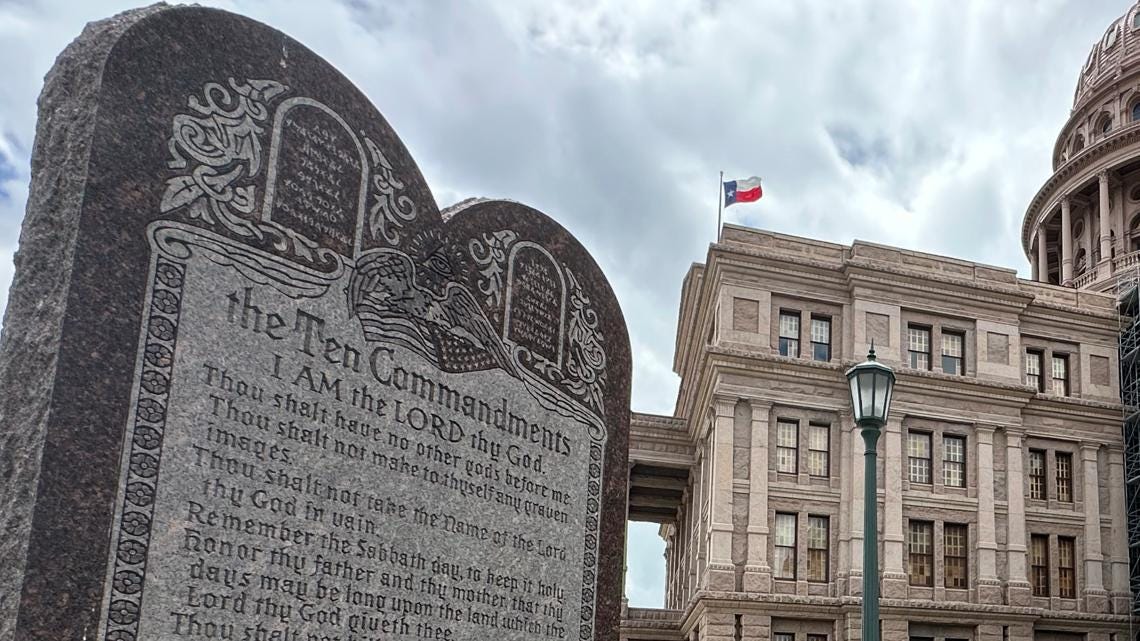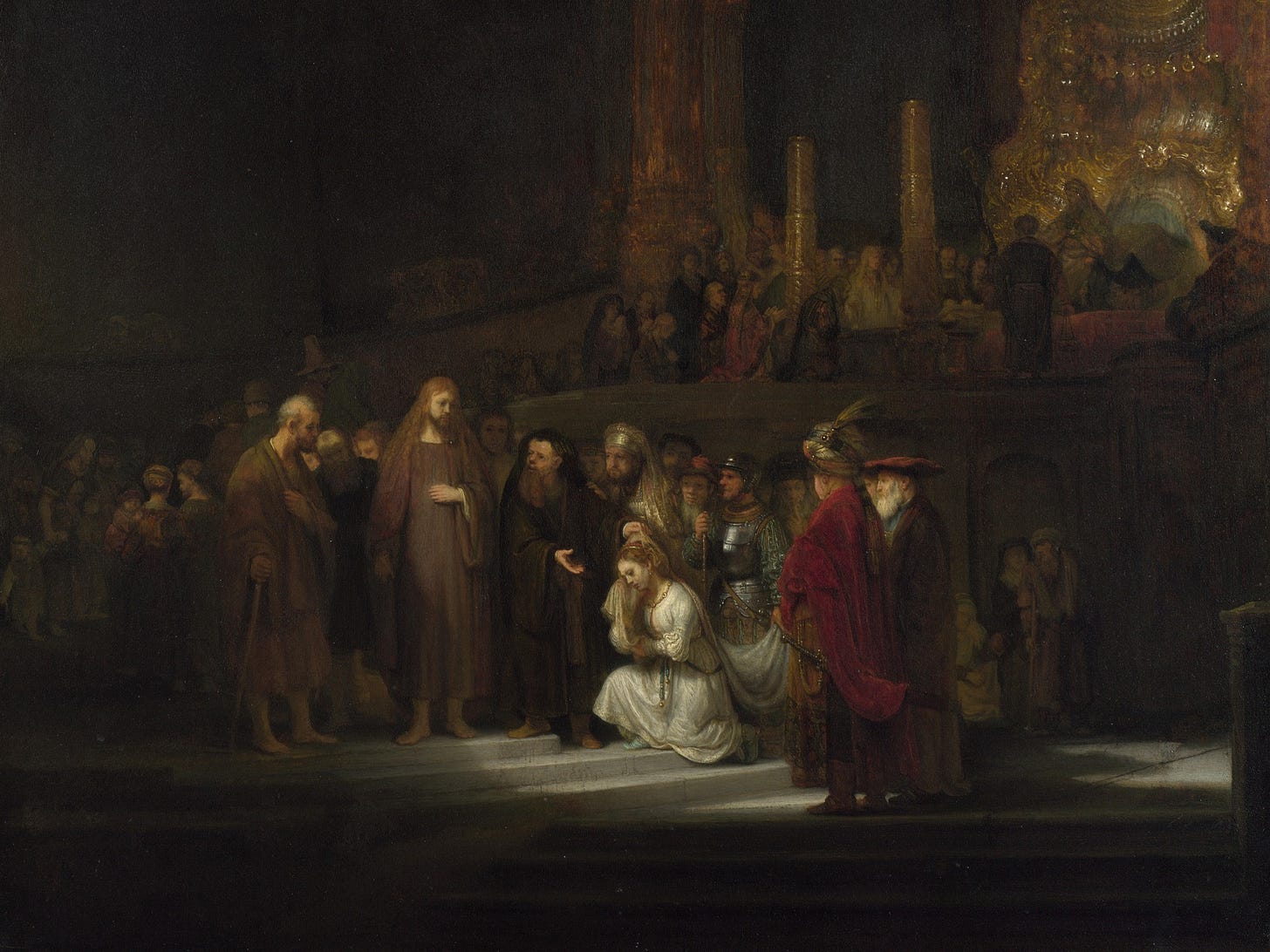When Blood Cries Out: Understanding the Sixth Commandment
This is Part 1 in an essay series examining what Scripture teaches about killing, justice, and moral boundaries in cases of war, self-defense, abortion, and more…
This is the first entry of an ongoing essay series, When Blood Cries Out, exploring the Christian moral framework surrounding the taking of life. Each entry examines a different domain where homicide intersects with law, ethics, and theology.
(Links will be added as essays are published.)
Series Index:
What is Murder? (You are here)
Self-Defense and the Christian Conscience
Just Wars and National Duty
Divine Justice and Civil Power
Abortion, Euthanasia, and the Silent Slaughters
The King James Bible gives us the familiar form: “Thou shalt not kill.” And yet, from the moment Cain spilled Abel’s blood, mankind has killed and debated what that commandment means.
Modern ethics offers few answers. In the absence of God, killing becomes a matter of paperwork: legal here, criminal there, moral if trending. Without a fixed standard—without a transcendent framework like Christianity—homicide becomes subjective. Definitions blur. The difference between murder and justice is no longer decided by truth, but by power.
This series makes the case that the Christian moral tradition remains not only relevant, but essential. Only by rooting our ethics in God’s revealed will can we rightly discern when taking life is sin—and when it may be permitted.
We begin here, with murder itself:
What does the sixth commandment truly forbid?
How do we distinguish premeditated murder from manslaughter or negligent death?
Why did Christ equate hatred with murder—and what does that mean for civil law?
From there, the series will expand to examine difficult cases where homicide may be justified or immoral: war, capital punishment, self-defense, abortion, euthanasia, and the modern state’s use of lethal force.
For justice to thrive, sentiment must be restrained—not to harden the heart, but to allow moral clarity and compassion, rooted in truth, to prevail.
The blood cries out. And it deserves an answer.
I. Why a Christian Framework Still Matters—Even for Atheists
Before we can ask when taking a life is justifiable, we must ask by what standard such a question can even be answered. Without a stable foundation, ethics in the secular age collapse into preference, power, or legality. But legality isn’t morality. And preference—however loudly expressed—is no substitute for truth.
If there is no transcendent standard, then what counts as “murder” becomes entirely arbitrary. One culture permits euthanasia; another calls it a crime. One regime calls rebels traitors; another calls them heroes. Without an anchor outside human consensus, we’re left drifting between competing wills. Today’s virtue becomes tomorrow’s hate crime. The blood of the innocent cries out, but who will hear it, if there is no God?
Consider the disturbing public response to the murder of UnitedHealthcare CEO Brian Thompson by Luigi Mangione in New York just last year. Social media lit up with support for Mangione: the hashtag #FreeLuigi was shared over 50,000 times, online merchandise celebrated him, and GoFundMe campaigns even raised hundreds of thousands of dollars.
More disturbingly, public polling revealed how deep this moral fracture runs. According to a national survey by CloudResearch, 12% of Americans outright supported the killing, with that number rising to 28% among younger, liberal respondents. An Emerson College/Axios poll found 41% of voters under 30 called the murder “acceptable”, with an additional 24% calling it “somewhat acceptable.” Even the Associated Press reported that many Americans placed more blame on the healthcare industry than on the killer himself.
In a world detached from divine justice, even murder can become a spectacle of vengeance, envy, or ideological scorekeeping. Outrage becomes the highest moral guide. The crowd becomes judge, jury, and executioner.
That’s why this series grounds its moral reasoning in the Christian tradition—not merely as a matter of faith, but as a matter of coherence. The Christian moral framework isn’t simply revealed; it’s ordered, rational, and consistent across time. It holds that life is sacred because it comes from God. That justice matters because God is just. And that mercy, too, must have its place—not because it feels good, but because it reflects the divine character of God.

Even those who don’t profess Christ must reckon with the fact that Western notions of human dignity, rights, and justice didn’t arise from nature or neutrality. They arose from the Christian conscience. And by anchoring ourselves to a Christian worldview, we don’t claim to possess perfect moral objectivity—but we do gain a foundation by which we may approach it.
II. What the Sixth Commandment Forbids
“Thou shalt not kill.” In Latin Vulgate: Non occides.
The sixth commandment is terse. But its meaning, in context, isn’t vague.
The Hebrew word used in Exodus 20:13—רָצַח (ratsach)—doesn’t refer to killing broadly, but to unlawful killing: what we would call murder. Most modern Bible translations make this plain, using “murder” rather than “kill”. Even the Septuagint translated it as οὐ φονεύσεις—“you shall not murder.”
And rightly so, because Scripture affirms this immediately. The very next chapter of Exodus distinguishes between premeditated and accidental death:
“Whoever strikes a man so that he dies shall be put to death. But if he did not lie in wait for him […] then I will appoint for you a place to which he may flee.”
— Exodus 21:12–13
The moral principle is clear: not all killing is murder, and not all killing violates the sixth commandment. God makes provision for punishment, war, and self-defense. But He also draws a line between just cause and bloodguilt.
Murder, then, isn’t merely the act of killing—but the unjust taking of life. That injustice may come from hatred, vengeance, cruelty, ambition, or even cowardice. But at its core is a rejection of what makes human life sacred: that man is made in the image of God.
“Whoever sheds the blood of man, by man shall his blood be shed, for God made man in his own image.”
— Genesis 9:6
The bloodguilt of murder extends beyond ending a life, encompassing the desecration of that divine image. It’s the theft of what belongs to God alone.
This is what sets Biblical ethics apart. The value of life isn’t a matter of utility, feeling, or legality—but of ontology. To murder is not merely to destroy, but to defy: it’s sacrilege against the Creator whose image every person bears.
This foundation is crucial because every ethical question to follow in this series builds on it. Whether we’re judging capital punishment, war, self-defense, or systemic violence, we must begin here: with a fixed standard that upholds true human dignity, not sentiment or social fashion.
Before we can discern whether a killing was just, we must first know what makes a killing unjust. And Scripture answers that candidly: when life is taken without God’s permission, it’s murder.
III. Jesus Expands the Law to the Heart
In the Bible, Christ doesn’t abolish the sixth commandment. He deepens it.
In His Sermon on the Mount, Jesus tells His disciples:
“You have heard that it was said to those of old, ‘You shall not murder; and whoever murders will be liable to judgment.’ But I say to you that everyone who is angry with his brother will be liable to judgment.”
— Matthew 5:21-22
This isn’t a legal revision. Christ doesn’t suggest that every angry man should be put on trial, nor that civil punishments be meted out for inward sin. Rather, He reveals a deeper moral trajectory of violence: that murder begins in the heart long before the hand acts. Cain’s blow was physical—but it was envy and hate that first distorted his soul.
In this way, Christ exposes the moral continuity between internal malice and physical violence. To nurse rage is to prepare for bloodshed. To despise another’s dignity is to deny his life its worth. Hatred doesn’t always end in death, but it always corrodes the soul. Even if no blood is shed, we’ve already desecrated the image of God—however marred—in ourselves.
Still, Christ’s teaching doesn’t erase the legal distinction between thought and action. The Old Testament affirms this distinction as well. In both Biblical and modern jurisprudence, guilt isn’t determined by outcome alone, but by intent. Common law calls this mens rea, the “guilty mind”—paired with actus reus, the “guilty act.”
A man who kills unintentionally, without hatred or premeditation, may still be guilty of sin, but not of murder. Even unintended bloodshed bears moral weight before God.
“Everyone who hates his brother is a murderer, and you know that no murderer has eternal life abiding in him.”
— 1 John 3:15
Christian ethics, then, begins with inward transformation. Civil law can restrain evil, but only God reforms the heart. Human courts may address action; divine justice addresses motive.
IV. Against Theonomic Misuse
Some today, in an effort to restore justice, advocate for a return to Old Testament civil penalties, including death for murder, adultery, and even blasphemy. This movement—known as theonomy—misapplies Scripture and misunderstands the nature of Christ’s kingdom.
When Jesus preached His Sermon on the Mount, He didn’t call for a reimplementation of Israelite legal penalties. Instead, He deepened the moral meaning of the commandment (Matthew 5:21–22). Christ exposed the internal root of murder—hatred—while deliberately avoiding any call for the civil punishment of those who harbor it.
Later, when questioned by Pilate, Jesus explicitly renounced any claim to earthly enforcement:
“My kingdom is not of this world. If my kingdom were of this world, my servants would have been fighting, that I might not be delivered over to the Jews.”
— John 18:36
He affirms a kingdom that transforms the heart. Not Mosaic civil law.
The apostles follow this logic. Paul, writing to Roman Christians under a pagan state, affirms civil authority not by invoking Israel’s law, but by appealing to natural justice:
“He is the servant of God, an avenger who carries out God’s wrath on the wrongdoer… for he does not bear the sword in vain.”
— Romans 13:4
Magistrates are legitimate—but they’re not Levites. They’re not called to enforce the Torah, but to restrain evil in general.
More importantly, Paul makes clear that Christians are no longer bound by the Mosaic code as a covenant of national identity or righteousness:
“Christ is the end of the law for righteousness to everyone who believes.”
— Romans 10:4
The ceremonial and civil elements of the law were “abolished in his flesh” (Ephesians 2:14-16). What remains binding is the moral core—summed up in love of God and neighbor—not the penalties assigned to ancient Israel.

The early Church upheld this distinction. Tertullian wrote that the Mosaic law was temporal, given to one people, and for a time, while Christ gave us the eternal law by faith and charity.
Justin Martyr echoed this, teaching that the ceremonial and judicial laws were given to restrain a hard-hearted people, but that in Christ, the law’s spiritual fulfillment is made known.
Origen, in the third century, made the point sharper still: Christians are called to nonviolence—not civil rebellion or war.
In short: the sixth commandment remains—but the civil enforcement of Old Testament Israel does not. God’s justice hasn’t changed. But the covenantal context has.
A Christian state may still punish murder. But it must do so through prudence rather than mimicry—and never pretend to wield divine sanction where Christ Himself withheld it.
In this way, both liberal relativism and theonomic maximalism fall short. The former denies truth altogether, reducing justice to arbitrary power. The latter demands truth be enforced in ways that disregard the redemptive purpose of the New Covenant, undermining the order and mercy established by Christ.
Christian ethics must walk a wiser path—one that applies eternal principles through time-bound means, respecting the differences between moral and civil law.
Where zeal demands executions for inward sins,
let the Church remember:
God alone judges the heart.
And mercy triumphs over judgment.
V. Accidental Killing, Negligence, and Bloodguilt
As mentioned earlier, not all killing is murder. Scripture makes this clear.
The Old Testament draws a sharp line between premeditated violence and unintentional death. The provision in Exodus 21:12–13 birthed the cities of refuge—safe havens where those guilty of unintentional killing could find asylum while awaiting judgment.
It was a system that upheld the sanctity of life while acknowledging the complexity of guilt. Bloodshed, even unintended, still defiled the land (Numbers 35:33). But not all death demanded retribution. Premeditation, motive, and recklessness were weighed carefully.
Deuteronomy 22:8, for instance, commands that a parapet be built around one’s roof “that you may not bring the guilt of blood upon your house.” Failure to take reasonable precautions—whether with rooftops, oxen, or weapons—was treated as morally serious. There may be no intent to harm. But where carelessness causes death, guilt still clings.
Western jurisprudence echoes this logic. Common law distinguishes between murder, voluntary manslaughter, involuntary manslaughter, and non-criminal accidental death. Intent is central. So is negligence.
A man who kills in sudden passion may be guilty of manslaughter, not murder. A man whose carelessness leads to death—through a reckless action or failure to act—may still bear criminal liability, even without malice. But where an accident occurs despite reasonable care, the law may find no crime at all.
This logic persists in Christian ethics. A man who leaves a firearm loaded and accessible to children may not be a murderer—but he isn’t innocent. Sin doesn’t always begin with hatred. Sometimes, it begins with indifference. It is the failure to love our neighbor through diligence and foresight.
Moral culpability doesn’t always require malice. Sometimes, it requires only the refusal to act with care.
And yet, Scripture preserves proportion—as should modern law. Not all guilt is equal. The penalties for negligence differ from those for malice. Biblical justice doesn’t flatten all guilt into the same shape. It discerns.
And so must we.
Blood cries out—even when spilled by accident. The difference is that, in such cases, it may cry for repentance, restitution, or reform rather than retribution. In a just society, legal codes must make room for all four.
The distinction between types of killing isn’t a technicality. It’s the foundation of justice.
A society that treats all bloodshed the same will either excuse too much or punish too broadly. Moral clarity demands we discern between intent, negligence, and malice—not to dilute accountability, but to apply it rightly.
Without this discernment, justice is distorted. The reckless man is treated like a killer. The soldier defending his homeland is labeled a murderer. The doctor who withholds euthanasia is called cruel, while the one who hastens death is praised as merciful. When the lines blur, truth collapses under the weight of sentiment or ideology.
The Bible doesn’t let us do that. It insists we look closely—at motives, consequences, hearts. It calls us to restrain not only evil but excess. Mercy must be just, and justice must be merciful.
This is why distinctions matter. Because we are not God. We see in part. And when we act in His name, especially in matters of life and death, we must do so with humility, precision, and fear.
In what follows, we’ll apply these distinctions to some of the hardest questions in modern ethics—cases where life hangs in the balance and truth is often obscured: self-defense, war, capital punishment, abortion, euthanasia, and the state’s use of lethal force.
If justice is to endure, it must be justly defined. And so we must understand, can a killing be just or even virtuous? We’ll explore this question in the next essay about self-defense and the Christian conscience.
Thanks for reading! If you believe the West is worth saving, then The Oak Remains is for you.
I write to uncover truth, restore forgotten foundations, and chart a way forward through faith, history, and first principles.
Want to support this work directly? Buy me a coffee or consider upgrading your subscription to help keep the lamp lit.




